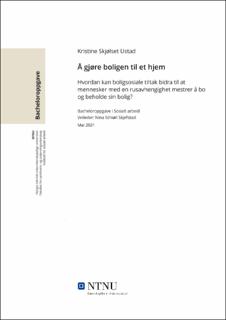| dc.contributor.advisor | Skjefstad, Nina Schiøll | |
| dc.contributor.author | Ustad, Kristine Skjølset | |
| dc.date.accessioned | 2021-09-28T18:47:49Z | |
| dc.date.available | 2021-09-28T18:47:49Z | |
| dc.date.issued | 2021 | |
| dc.identifier | no.ntnu:inspera:79529603:35206866 | |
| dc.identifier.uri | https://hdl.handle.net/11250/2785762 | |
| dc.description.abstract | Denne oppgaven skal se på hvordan boligsosiale tiltak kan bidra til at mennesker med en rusavhengighet mestrer å bo og beholder sin bolig. Mange rusavhengige har tidligere hatt en utfordrende bo-karriere med mislykkede leieforhold, lite eller ingen bo-kompetanse og lite støtte i sitt sosiale nettverk. For å få disse menneskene inn på boligmarkedet igjen kreves det et godt samarbeid mellom de ulike hjelpeinstansene, samt varierte boligmasser med mulighet for oppfølging ved behov. Oppgaven fokuserer på den kommunale boligmassen i Norge og tar utgangspunkt ut ifra dette. Resultatet viser at det er mange faktorer innenfor boligsosiale tiltak som er med på å påvirke hvorvidt mennesker med en rusavhengighet mestrer sitt boforhold. Et viktig forarbeid i form av kartlegging er med på å danne et grunnlag for å finne ut hva slags oppfølging er hensiktsmessig og hvorvidt bo-trening kan være med på å styrke bo-kompetansen. Hvilken bolig den rusavhengige blir bosatt i spiller også en rolle, både i form av beliggenhet, utforming og naboskap. Dette kan være faktorer som spiller inn på hvorvidt boligen blir et trygt hjem eller en bolig som fører til ytterligere isolering. | |
| dc.description.abstract | The aim of this thesis is to investigate how housing policy instruments can contribute to a enabling people with substance abuse to successfully live and keep their housing. Many of those struggling with drug addiction have a troubled history within their living career with unsuccessful tenancies, little and short-lived competence in living and little support in their social network. In order to get these people to out into the housing market again good cooperation between the different aid agencies is required, as well as varied housing stocks with the opportunity of getting follow-up if needed. Furthermore, the focus of this thesis will be based around the municipal housing stock in Norway. The results showcase that there are many different factor within social housing measures which influences the outcome of whether or not people with substance abuse are able to master their living condition. A crucial part of forming a basis in order to explore what kind of follow-up is necessary and whether or not living training can help strengthen living skills, is to in-depth preparatory work in the form of mapping. The housing the drug addict gets residency in also plays a role, both in terms of location, design and neighbourhood. These could all be factor that play into whether or not the housing becomes a stable and safe home, or a housing that leads to further isolation. | |
| dc.language | nob | |
| dc.publisher | NTNU | |
| dc.title | Å gjøre boligen til et hjem | |
| dc.type | Bachelor thesis | |
